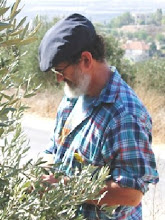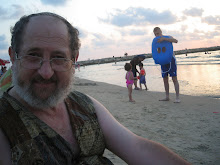יום חמישי, 8 בפברואר 2024
יום שלישי, 3 באוקטובר 2023
Link to The Partisan's Coat at Amazon
So here is the link for people in the US or for Israelis who order from Amazon.
Germany - https://tinyurl.com/partisancoat
United Kingdom - https://amzn.to/48Hyuiu
יום רביעי, 20 בספטמבר 2023
"The Partisan's Coat" is published! but will anyone read it?
https://www.jiff.com.au/films/revenge-our-dad-the-nazi-killer
My novel, "The Partisan's Coat" is being printed now to be ready for marketing and book launches right after Sukkot, starting at the Jewish International Film Festival in Australia end of October, into first half of November. I'm looking for reviewers who are willing to read the pdf and share their comments in print.
Any takers or suggestions as to who to ask? Thank you in advance!
Description on the back cover reads:
in Minsk. There it was, his coat, just like the one he had found
as a child in a dusty suitcase in Melbourne. Once, it had kept a
heroic Jewish partisan warm in the freezing forests of Belarus.
Yanosh and Eva, Holocaust survivors, have built new lives in
Australia, far away from the horrors, but Joe, their son, caught
up in the passions and intimacies of a Zionist youth movement,
is inexorably drawn to the alternative they rejected: Israel.
Arriving in the land of his dreams in the devastated aftermath of
the 1973 Yom Kippur War, he hopes to find the partisan behind
his coat. Is he still alive? Really dead? Or now a Mossad agent?
Joe is intent on strengthening the country he loves and building
a family of his own. But as he begins to unravel the fragmentary
stories of friends and family members, the coat’s enigmatic
original owner criss-crosses his life, forcing him to question his
loyalties, his faith and his identity.
Wishing us all Chag Sameach, Shabbat Shalom,
love, Yehiel/Jon
יום שבת, 18 באפריל 2020
A word of Torah before Yom Hashoa
PARASHAT SHEMINI AND YOM HASHOAH: ON SILENCE & SPEAKING
0 Comments 17 April 2020
Our tradition teaches us the value of silence and the value of raising one’s voice. As the entire globe grapples with the current pandemic, when are we to stand silent and when are we to shout?

A burning yahrzeit candle to memorialize those who have passed
By Rabbi Yehiel Grenimann
In the coming weekly Torah reading there appears the dramatic story of the death of Aharon, the High Priest’s two sons, Nadav and Avihu. They sacrifice a “foreign fire” on the altar and are burned and die on the spot.
Moshe responds with the enigmatic words “with those close I will sanctify” apparently to comfort Aharon. Aharon’s response is silence – “And Aharon was silent” (Leviticus 10: 1-4).
What is the meaning of this silence? Is Aharon comforted by Moshe’s words?
During the intermediate days of the Passover holiday I read an article by Professor Nitza Ben Dov The Holiness of Silence that appeared in Haaretz newspaper the eve of Passover. In this article she mentioned the episode of Aharon’s silence in a broader context in discussing the meaning of silence in Jewish sources and culture. She presented the words of the poet Haim Nahman Bialik who argues that words come to cover over or flee from confrontation with disaster and in particular with death:
“So here a person dies – and the place is emptied – there is a vacuum. There is nothing that can distract from the fact – the protective separation is removed … and we sit before it for a moment on the dark earth, in mourning silent like a stone…but even before the dead is buried – we find already that the vacuum is filled again with words, be they of eulogy, or words of condolence or philosophy or belief in the eternity of the soul” (from his essay Revelation and Hiddenness in Language).
About this Professor Ben Dov writes:
“In other words ‘the words’, using Bialik’s language, are defenses against the difficult truth, since silence is itself the most authentic expression, the most natural and appropriate in the face of death and bereavement. It is well to remember the immortal verse of just those two words ‘And Aharon was silent’ (“Vayidom Aharon”) when he was told of the death of his two sons.”
We are suffering these days from a flood of words about the coronavirus and its future impact in the unknown time ahead from the mainstream and social media. There is no doubt that this wash of words is largely fueled by flight from psychological confrontation with the dangers sitting on us at present. But it also increases the great anxiety of many people regarding the future. I am concerned that the frightening of the public is not altogether innocent even though the health crisis facing us is real enough and measures must be taken.
There is, as it says in the Book of Ecclesiastes, “A time to be silent, and a time to speak out” (Chapter 3: 7). There are things that it is preferable to be silent about but there other things about which it is wrong to be silent.
Regarding matters of faith it is wise to be cautious but about the injustices and corruption of a regime, the exploitation and neglect of the weak, and a process in which a state is brought closer to autocratic and arbitrary rule one must not be silent.
Many of those who survived the Holocaust knew to be silent and to mobilize themselves psychologically to continue their lives. My two parents, Holocaust survivors from Poland did that. Only after a few decades had passed did one of the survivors begin to speak up and share in testimonies what they had survived. During the seventies and eighties of the previous century (for a decade), I had the honour to be involved in teaching about the Holocaust and meeting many survivors. Many of them spoke of the importance of resisting evil regimes and of speaking out against injustice and racism, and the need to protect minorities, to watch out for signs of fascism. The International Declaration of Human Rights of the U.N. was a direct response to the war crimes of the Nazis.
One subject that many refused to relate to in public was that of religious faith after the Holocaust.
I often heard from survivors after they had given their testimony in public and been asked that question that they had been reluctant or unable to answer because they preferred not to talk about belief in God in front of young people in order to avoid damaging their faith. I was also often told that what they related in these seminars (at Masuah, Ot VaEd and Yad Vashem), they would not tell their own children because they wanted to protect their souls.
To go back to the article we shared: After a fascinating and sensitive discussion about the role of silence in the Book of Job, in a poem by the poetess Rivka Miriam that relates to silence in the face of the Holocaust on Yom Kippur and in the story of the “silent” prayer of Chana in the Book of Kings she ends her article thus:
“The holiness of silence on Yom Kippur leads us to the sanctification of silence in the tow minutes of silence on Holocaust Memorial Day and on the Memorial Day for the fallen Soldiers. Also on these occasions we are silent not from a challenge to heaven, nor from the hope of receiving an answer and not in rebellion…
The silence of a house of mourning, in a synagogue and throughout the country that commemorates its dead is the attempt to not distract ourselves through talk but rather to express both personally and collectively that which is precious and in common for all of us. Just as the Divine reveals Itself to Elijah not in the wind, not in the thunder nor in fire but in a small thin silent voice (Kings 1: 19,11) so is it appropriate, the covenant between us and all parts of our people should be understood, without any unnecessary words.”
I would add to Nitza Ben Dov’s thoughts here that the same sensitivity in silence and the same common fate when faced with this plague, the suffering and death about which she writes should apply to all humankind, and in particular to all inhabitants of this tiny land at this time of crisis.
Beyond that it is important not to be silent when a crisis situation is used as a cover for hurting weaker populations and damaging the human rights of all of us. For this purpose organizations like Rabbis For Human Rights were created. To be strong on this issue is one of the most important lessons to be learned from the events that led to the Holocaust.
May it be God’s Will that we become able to leave our isolated homes and emerge from the present social isolation that has been forced upon us with a renewed humanity and greater sensitivity to the suffering and death of those who came before us and to those now suffering and mourning around us. And with that, we must resolve to continue to let our voice be heard in a call for justice, healing and in the creation of hope.
Wishing us all a peaceful Sabbath!
Rabbi Yehiel Grenimann sits on the board of RHR, having served as a director for a number of years prior to retiring to work on his second novel.
|
|
הירשם ל-
רשומות (Atom)


